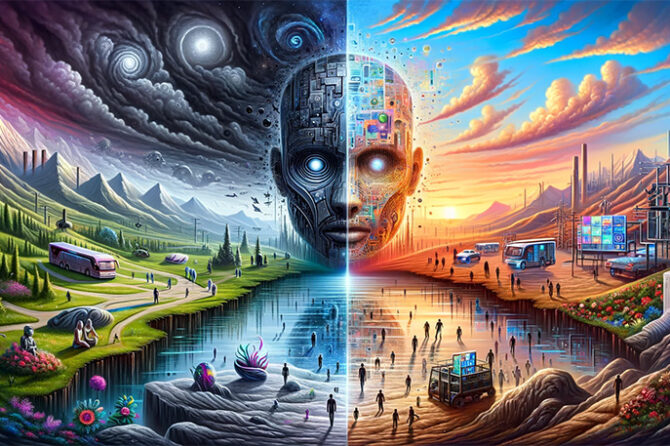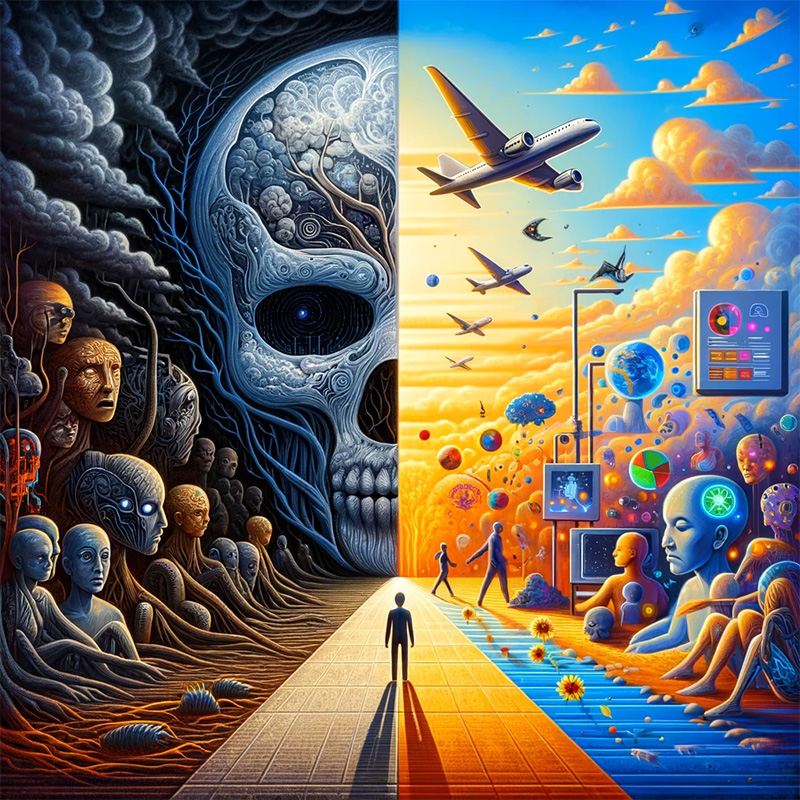
In a recently published article, “AI’s Dystopian Echo Chamber,” the author John Nosta, a renowned thought leader in digital health and technology, warns that, the Artificial Intelligence (AI), particularly in Large Language Models (LLMs) like GPT-4, a phenomenon known as the “dystopian echo chamber” poses significant challenges. This term refers to the shaping of AI perspectives and biases influenced heavily by human-generated content, often tinged with a dystopian view of AI. Such an outlook risks skewing AI’s understanding of human concerns and priorities, potentially leading to a misalignment with a broader spectrum of human values and ethical decision-making.
John Nosta blends scientific knowledge with creative insight to explore the impact of technology on society. Nosta delves into the societal and ethical implications of AI, addressing a broad audience from tech enthusiasts to professionals. His work stands out for its deep understanding of AI’s technical aspects and its humanistic impacts, focusing on how technological advancements influence daily life and societal norms. His insightful commentary contributes significantly to discussions about the future of health and technology
The Paradox of Perception in AI Development
AI’s learning process is analogous to a child absorbing the worldviews and biases of their environment. When this environment predominantly features dystopian narratives about AI, it risks “poisoning the well” of AI’s informational corpus. As society amplifies these dystopian themes, they become more prevalent in the data AI learns from, creating a feedback loop where AI is continually exposed to, and potentially influenced by, these narratives.
Implications of a Skewed Perspective
This distorted view can manifest in various forms, such as biases in AI’s decision-making processes and limitations in AI’s potential to address diverse human challenges. For example, an AI trained predominantly on dystopian content may develop ethical frameworks and response mechanisms steeped in fear and apprehension, rather than balanced human perspective. This could have far-reaching implications:
- Bias in AI Decision-Making: AI’s skewed understanding might influence its responses to queries and its ethical frameworks, potentially leading to decisions misaligned with balanced human perspectives.
- Limiting AI’s Potential: AI’s ability to effectively address diverse challenges like healthcare or environmental sustainability could be compromised if its training corpus is dominated by dystopian content.
- Shaping Public Perception: The information generated by AI influences public perception. If AI outputs reinforce dystopian themes, it could further entrench these perspectives in society.

Strategies for a Balanced AI Corpus
To address the challenges posed by the “dystopian echo chamber,” a multi-faceted approach is essential:
- Diversified AI Training Data: AI should be trained on a diverse dataset, encompassing a broad range of human experiences and perspectives.
- Ethical AI Development: AI developers must be cognizant of the potential impact of training data on AI behavior and emphasize ethical guidelines and responsible development practices.
- Public Education and Awareness: Educating the public about AI realities is crucial. A well-informed public can contribute more balanced perspectives to the AI discourse.
- Continuous Monitoring and Adjustment: AI systems should be regularly monitored and adjusted to ensure they are not unduly influenced by any particular set of narratives.
The Paradox of Control and the Path Forward
The pervasive myth of an AI apocalypse could ironically become a self-fulfilling prophecy. As society continually discusses, fears, and amplifies this narrative, it becomes deeply embedded within the corpus of human information that AI models are trained on. This could influence AI’s understanding of, and representation of, its relationship with humanity.
If there are monsters in the AI narrative, they are not the algorithms or the machines; they are complacency and misinformation. They create a feedback loop where unfounded fears drive actions that reinforce those fears. In today’s clickbait world, sensationalism often trumps informative discourse.
Finale: Shaping AI’s Future with Balanced Narratives
We stand on the cusp of an AI-driven future, and it is imperative to approach this subject with a clear understanding, free from the shackles of fear or misinformation. By addressing the “dystopian echo chamber” in AI’s informational corpus, we can ensure that AI develops in a way that reflects the full spectrum of human experience and values. The future of AI should be shaped not by our fears, but by our hopes and aspirations. Only then can we harness AI’s true potential and ensure that it benefits humanity as a whole.
Prof. Dr. Prahlada N. B
22 December 2023
Chitradurga.

















Leave a reply